名词性从句讲解
名词性从句讲解(最全版)
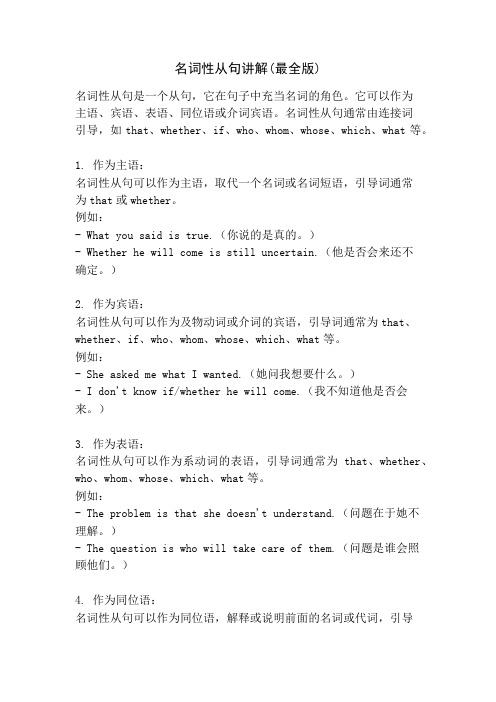
名词性从句讲解(最全版)名词性从句是一个从句,它在句子中充当名词的角色。
它可以作为主语、宾语、表语、同位语或介词宾语。
名词性从句通常由连接词引导,如that、whether、if、who、whom、whose、which、what等。
1. 作为主语:名词性从句可以作为主语,取代一个名词或名词短语,引导词通常为that或whether。
例如:- What you said is true.(你说的是真的。
)- Whether he will come is still uncertain.(他是否会来还不确定。
)2. 作为宾语:名词性从句可以作为及物动词或介词的宾语,引导词通常为that、whether、if、who、whom、whose、which、what等。
例如:- She asked me what I wanted.(她问我想要什么。
)- I don't know if/whether he will come.(我不知道他是否会来。
)3. 作为表语:名词性从句可以作为系动词的表语,引导词通常为that、whether、who、whom、whose、which、what等。
例如:- The problem is that she doesn't understand.(问题在于她不理解。
)- The question is who will take care of them.(问题是谁会照顾他们。
)4. 作为同位语:名词性从句可以作为同位语,解释或说明前面的名词或代词,引导词通常为that、whether、who、whom、whose、which、what等。
例如:- The fact that he lied surprised me.(他撒谎的事实让我感到惊讶。
)- His belief that she will succeed is unwavering.(他坚信她会成功。
名词性从句讲解及专项练习习题及解答
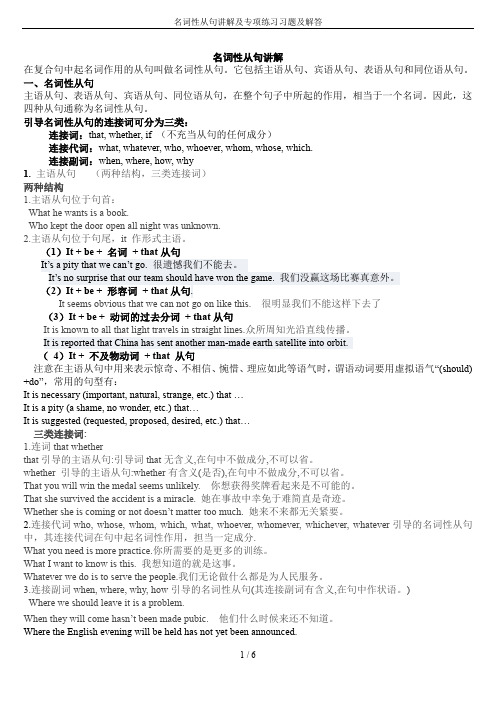
名词性从句讲解在复合句中起名词作用的从句叫做名词性从句。
它包括主语从句、宾语从句、表语从句和同位语从句。
一、名词性从句主语从句、表语从句、宾语从句、同位语从句,在整个句子中所起的作用,相当于一个名词。
因此,这四种从句通称为名词性从句。
引导名词性从句的连接词可分为三类:连接词:that, whether, if (不充当从句的任何成分)连接代词:what, whatever, who, whoever, whom, whose, which.连接副词:when, where, how, why1. 主语从句(两种结构,三类连接词)两种结构1.主语从句位于句首:What he wants is a book.Who kept the door open all night was unknown.2.主语从句位于句尾,it 作形式主语。
(1)It + be + 名词+ that从句It’s a pity that we can’t go. 很遗憾我们不能去。
It’s no surprise that our team should have wo n the game. 我们没赢这场比赛真意外。
(2)It + be + 形容词+ that从句.It seems obvious that we can not go on like this. 很明显我们不能这样下去了(3)It + be + 动词的过去分词+ that从句It is known to all that light travels in straight lines.众所周知光沿直线传播。
It is reported that China has sent another man-made earth satellite into orbit.(4)It + 不及物动词+ that 从句注意在主语从句中用来表示惊奇、不相信、惋惜、理应如此等语气时,谓语动词要用虚拟语气“(should) +do”,常用的句型有:It is necessary (important, natural, strange, etc.) that …It is a pity (a shame, no wonder, etc.) that…It is suggested (requested, proposed, desired, etc.) that…三类连接词:1.连词that whetherthat引导的主语从句:引导词that无含义,在句中不做成分,不可以省。
高中名词性从句详细讲解+例句

名词性从句I. !"#$%&一、定义名词性从句是在句子中起名词作用的句子。
它在复合句中能担任主语、宾语、表语、同位语,分别称为主语从句、宾语从句、表语从句和同位语从句。
二、分类&表语从句1) That is(系动词) a book.S + P 表语2) The fact is(系动词)that he has lied to usS + P 表语从句&宾语从句1) He said(vt) nothing at the meeting.S + P 宾语2) He said (vt) (that) he would help us without hesitation.S + P 宾语从句3) He is interested in (prep) what we want for breakfast.S + P 宾语从句&主语从句1) His mistakes made his teacher angry.主语+ P2) That he made so many mistakes made his teacher angry.主语从句P3)What he said made his teacher angry.主语从句P&同位语从句1) You can turn to my friend Tom for help.S + P 同位语2) The announcement that a new airport was to be built nearby made us excited.S 同位语从句+ P3) We heard the news that the war had broken out between America and Iraq.S + P 同位语从句三、引导词名称引导词在从句中担任成分连接词that, whether, if 不作成分连接代词what, whatever, who, whoever, whose, which, whichever 主语、宾语、表语、定语连接副词when, where, why, how, whenever, wherever, however 状语例如:a. He said that he would come.b. Whether he can pass the exam is not certain.c. He agrees with what I said.d. He agrees with what was said.e. I don’t know what present I should buy.f. That is where Tom used to live.g. That’s why he left.四、名词性从句语序名词性从句用陈述句语序。
名词性从句讲解(共30张PPT)
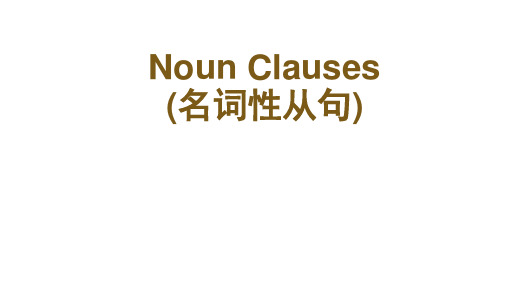
I don’t like his job. I don’t like what he does every day.
I don’t know about the man, Mr. White. I don’t know about the fact that he is a teacher.
主语
表语
4. This is what he does every day.
主语
表语
5. I don’t like what he does every day. 动词宾语
主语
宾语
英语句子的种类
简单句 (simple sentence) 并列句 (compound sentence) 复合句 (complex sentence)
❖Lin Tao feels (that) his own team is even better. ❖She says (that) she won’t take part in the sports meeting next Sunday. ❖Jim thought (that) the train was like a big moving party.
引导词
连词 that, whether, if
疑问代词 who, whom, whose, which, what, whoever, whatever等
疑问副词 when, where, why, how等
Object Clause 宾语从句
1. I know him . (简单句)
主语 谓语 宾语
think, find, consider, believe, feel, make
语法讲解_名词性从句
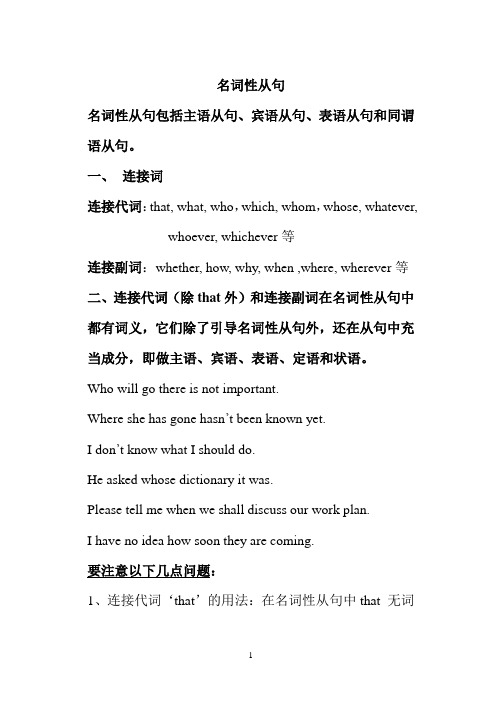
名词性从句名词性从句包括主语从句、宾语从句、表语从句和同谓语从句。
一、连接词连接代词:that, what, who,which, whom,whose, whatever, whoever, whichever等连接副词:whether, how, why, when ,where, wherever等二、连接代词(除that外)和连接副词在名词性从句中都有词义,它们除了引导名词性从句外,还在从句中充当成分,即做主语、宾语、表语、定语和状语。
Who will go there is not important.Where she has gone hasn’t been known yet.I don’t know what I should do.He asked whose dictionary it was.Please tell me when we shall discuss our work plan.I have no idea how soon they are coming.要注意以下几点问题:1、连接代词‘that’的用法:在名词性从句中that 无词义,在从句中不充当任何句子成分,只起连接从句的作用,在宾语从句中,that在口语中可以省略。
但在引导主语从句时不能省略。
That he was chosen made us very happy.We heard the news that our team had won.The truth is that he is the best in his class.He said (that) he would see me the next week.2、引导宾语从句的that可省略,但及物动词后有两个宾语时,可省略第一个that, 不省略第二个that;如有形式宾语时,连接真正宾语的that 不能省略。
They made it a rule that they got up at six every day.3、由连词that引导的名词从句很少做介词的宾语,只在except, but , besides介词后看到,其他一些介词的宾语从句如果由连词that 引导,需用it作形式宾语。
高中英语语法---名词性从句详解
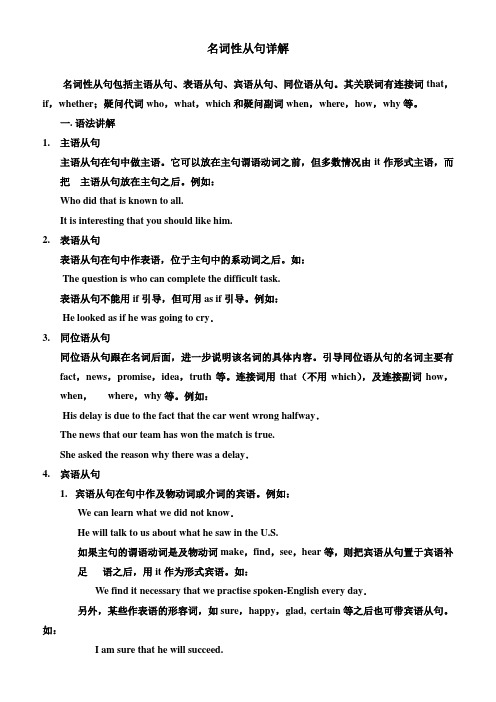
名词性从句详解名词性从句包括主语从句、表语从句、宾语从句、同位语从句。
其关联词有连接词that,if,whether;疑问代词who,what,which和疑问副词when,where,how,why等。
一.语法讲解1.主语从句主语从句在句中做主语。
它可以放在主句谓语动词之前,但多数情况由it作形式主语,而把主语从句放在主句之后。
例如:Who did that is known to all.It is interesting that you should like him.2.表语从句表语从句在句中作表语,位于主句中的系动词之后。
如:The question is who can complete the difficult task.表语从句不能用if引导,但可用as if引导。
例如:He looked as if he was going to cry.3.同位语从句同位语从句跟在名词后面,进一步说明该名词的具体内容。
引导同位语从句的名词主要有fact,news,promise,idea,truth等。
连接词用that(不用which),及连接副词how,when,where,why等。
例如:His delay is due to the fact that the car went wrong halfway.The news that our team has won the match is true.She asked the reason why there was a delay.4.宾语从句1.宾语从句在句中作及物动词或介词的宾语。
例如:We can learn what we did not know.He will talk to us about what he saw in the U.S.如果主句的谓语动词是及物动词make,find,see,hear等,则把宾语从句置于宾语补足语之后,用it作为形式宾语。
初中英语语法——名词性从句讲解及练习
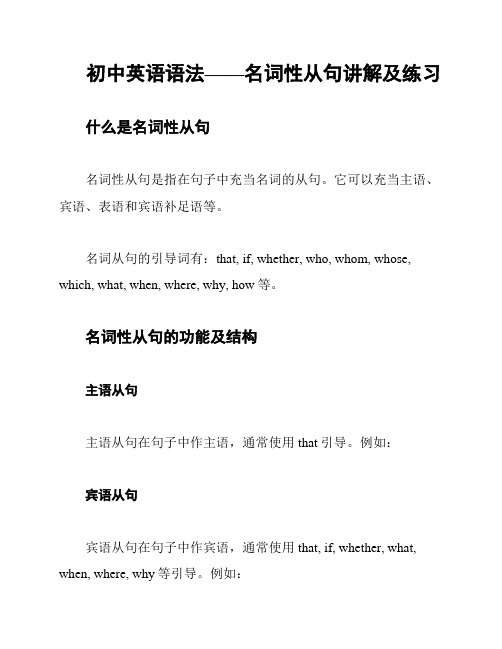
初中英语语法——名词性从句讲解及练习什么是名词性从句名词性从句是指在句子中充当名词的从句。
它可以充当主语、宾语、表语和宾语补足语等。
名词从句的引导词有:that, if, whether, who, whom, whose, which, what, when, where, why, how等。
名词性从句的功能及结构主语从句主语从句在句子中作主语,通常使用that引导。
例如:宾语从句宾语从句在句子中作宾语,通常使用that, if, whether, what, when, where, why等引导。
例如:- She asked me what I wanted for dinner.(她问我晚饭想吃什么。
)what I wanted for dinner.(她问我晚饭想吃什么。
)表语从句表语从句在句子中作表语,通常使用that, if, whether等引导。
例如:- My only hope is that the weather will be good tomorrow.(我唯一的希望是明天天气好。
)that the weather will be good tomorrow.(我唯一的希望是明天天气好。
)- The problem is whether he can solve it.(问题在于他能否解决。
)whether he can solve it.(问题在于他能否解决。
)宾补从句宾补从句在句子中作宾补,通常使用that, if, whether等引导。
例如:- They made me believe that anything is possible.(他们让我相信一切皆有可能。
)that anything is possible.(他们让我相信一切皆有可能。
)- I find it amazing that she can speak five languages.(我发现她能说五种语言真是令人惊奇。
名词性从句 语法讲解

只能用whether不能用if的情况
1.在介词后面: I’m thinking of whether we should go fishing. We didn’t think about whether it would rain the next day. 2.在动词不定式前: They asked me whether to sit at the front.
.
2.注意点
1).宾语从句一律用陈述句的语序. 2).引导宾语从句的连词that也无实际意义,多数 情况下可以省略. 3).whether和if都可以引导宾语从句,但二者用 法不同.
5).that在宾语从句中的省略与保留
(1).在主+谓+it(形式宾语)+宾补+that从句(真正宾语) 的句型中不省略. 例: We must make it clear that we mean what we say. (2).由连词and连接的两个由that引导的宾语从句中, 第一个that 可以省略,第二that不能省. He told me (that) he would come and that he would come on time. (3)that一般不充当介词宾语偶尔可作 except, in ,but的宾语;其它介词后要用that 从句作宾语须用it 作形式宾语.
Hale Waihona Puke 1. ____ we can't get seems better than ____ we
have. A.What , what C. That , that
B. What , that D. That , what
2. It worried her a bit ____ her hair was turning grey. A.while C.if B.that D.for
名词性从句详细讲解

名词性从句宾语从句1、连接代词:who, whose, whom, what, which。
在从句中担任成分,如主语、表语、宾语、或定语等。
2、连接副词:when, where, why, how。
在从句中担任成分,作状语。
3、连词:that, whether, if, as if。
在从句中不担任成分,注意:引导词的作用:1 连词whether 和if(是否),as if(好象)只有连接的功能,而不在从句中充当句子成分。
that作连接词,本身无任何含义。
2. 连接代词和连接副词不但有连接的功能,同时还要在从句中充当一定的句子成分,如主语、宾语、表语、定语、状语宾语从句:从句在句中充当宾语的成分。
宾语从句可作谓语动词的宾语,也可作介词的宾语,还可作某些形容词的宾语从句。
一般由that, whether, if, who, whose, what, which, when, where, how, why 等连接Jenny thought (that) her teacher was unfair.I’d like to know which one is your husband.I am sure (that) he won’t mind.He said that he was doing his homework. (注意时态的对应)Mother told me that she would buy a bike for me.I don’t know when he will come.注意think, believe, suppose等的用法(反意疑问句一从二三主)I think that he will come, won’t he?She thinks that he will come, doesn’t she?I don’t think he will come, will he?I think that he will come (提问he) Who do you think will come?that引导宾语从句无意义,不充当句子成分常省略。
名词性从句全面讲解

名词性从句全面讲解名词性从句是英语中的一种从属从句,它在句中充当名词的功能。
名词性从句可以在句子中作主语、宾语、表语和同位语等,并且可以由不同的引导词引导。
本文将全面讲解名词性从句的基本概念、用法及常见的引导词。
一、名词性从句的概念名词性从句是由一个词或一个词组引导的从句,它在句子中充当名词的角色。
名词性从句通常出现在复杂的句子中,起到连接主句和从句的作用。
名词性从句的引导词有很多种类,常见的有:that, whether, if, what, which, who, whom, whose, when, where, why等。
二、名词性从句的用法名词性从句可以在句子中作不同的成分,下面分别介绍其主要用法。
1. 名词性从句作主语名词性从句可以作为主语来引导句子,常用的引导词有:- That: That he is innocent surprises me.(他是无辜的让我吃惊。
)- Whether/If: Whether he will come or not is uncertain.(他是否会来还不确定。
)- What: What you said is true.(你说的是真的。
)2. 名词性从句作宾语名词性从句可以作为宾语来引导句子,常用的引导词有:- That: I know that he is a doctor.(我知道他是个医生。
)- Whether/If: I wonder whether/if it will rain tomorrow.(我想知道明天是否会下雨。
)- What: I don't understand what he is saying.(我不明白他在说什么。
)3. 名词性从句作表语名词性从句可以作为表语来引导句子,常用的引导词有:- That: The truth is that she is not happy.(事实是她不幸福。
)- Whether/If: The question is whether/if we should go or not.(问题是我们是否应该去。
高中英语名词性从句详细讲解
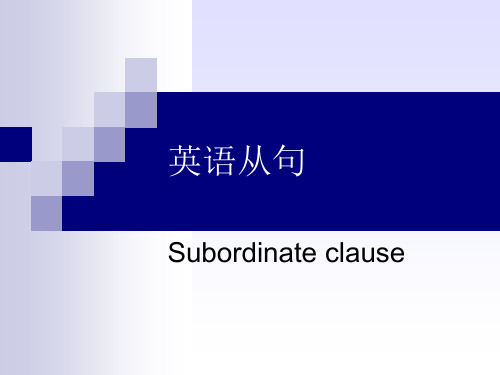
6.条件状语从句 常用引导词:if, unless, We'll start our project if the president agrees. 7.让步状语从句 常用引导词:though, although, even if, even though The old man always enjoys swimming even though the weather is rough. 8.比较状语从句 常用引导词:as(同级比较), than(不同程度的比较) She is as bad-tempered as her mother. The house is bigger than ours. 9.方式状语从句 常用引导词:as, as if, how When in Rome, do as the Roman do. She behaved as if she were the boss.
Exercises
1_________ in the regulations that you should not tell other people the pass word of your e-mail account. .(2005 上海) A. What is required B .What requires C It is required D. It requires 2. The Foreign Minister said, “_______ our hope that the two sides will work towards peace.” (2006 北京) A. This B. There is C .That is D. It is 3.After Yang Liwei succeeded in circling the earth,_______ our astronauts desire to do is walk in space.(2004 上海) A .where B .what C .that D. how
高中英语名词性从句详细讲解

注意:在demand,order,suggest,decide, insist, desire, request, command等表示要求、 命令、建议、决定等意义的动词后,宾语从 句常用“(should)+ 动词原形”。 I insist that she (should) do her work alone. 我 坚持要她自己工作。 The commander ordered that troops (should) set off at once. 司令员命令部队马上出发。
连接副词:when, where, how, why, whenever, wherever, however 有意义,在从句中担任状语
三、用法(Ⅰ)主语从句(在句中作主语) That she'll be present at the meeting has excited us. Whether they'll come or not is not sure. What he wants to tell us is not clear. Who'll win the game is still unknown. Where the English evening party will be held has not yet been announced. It has not been announced where... 注意:有时为了避免头重脚轻常用形式主语it代 替 主语从句放在句首,而把主语从句置于句 末,主语从句后的谓语动词一般用单数形式, 常用句型如下:
宾语从句中用it作形式宾语
注意:如果主句中有形容词或名词作宾语补足 语时,一般用it来作形式宾语,把从句放在宾 补后面。 都是有那些词呢? We think it our duty that we should help others. 我发现他两天之内完成工作是不可能的.
名词性从句简单讲解

名词性从句之异同名词性从句可分别作主句的主语、宾语、表语和同位语,在英语阅读和运用中经常遇到,是高中英语中主要学习内容,。
名词性从句在结构上有其许多相似之处,也有一些明显之区别。
一、名词性从句的相同之处1. 关连词相同。
A)连词that,whetherB)连接代词who,what,which,whoseC)连接副词when,where,why,how2.名词性从句均不能用逗号和主句分开。
二、名词性从句句法结构不同用法区别1.主语从句能用it作形式上的主语。
常用以it作形式主语的句型有:①It + be + 形容词(obvious, true, natural, surprising, good, wonderful, funny, possible, likely, certain, probable, quite clear, unusual, etc.) + that从句。
如:It is certain that she will do well in her exam.It is probable that he told her everything.②It + be + 名词词组(no wonder, an honour, a good thing, a pity, no surprise, etc.) + that 从句。
如:It's a pity that we can't go.It's no surprise that our team should have won the game.③It + be + 过去分词(said, reported, thought, expected, decided, announced, arranged, etc.) + that从句。
如:It is said that Mr Green has arrived in Beijing.It is reported that China has sent another man-made earthsatellite into orbit.④It + seem, happen等不及物动词及短语+ that从句。
名词从句讲解
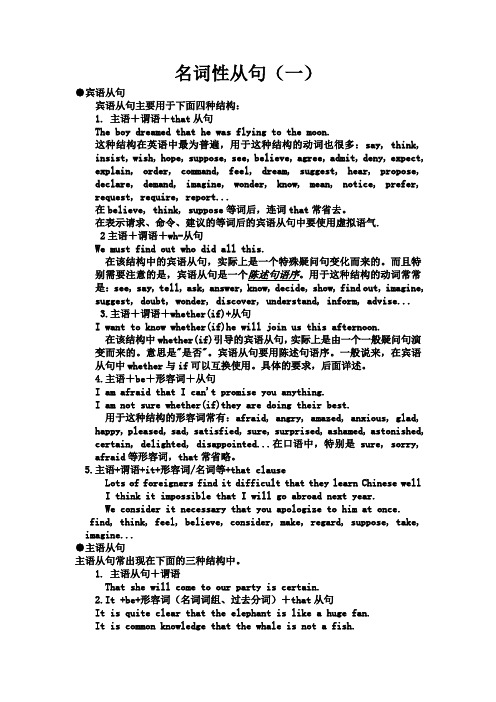
名词性从句(一)●宾语从句宾语从句主要用于下面四种结构:1.主语+谓语+that从句The boy dreamed that he was flying to the moon.这种结构在英语中最为普遍,用于这种结构的动词也很多:say, think, insist, wish, hope, suppose, see, believe, agree, admit, deny, expect, explain, order, command, feel, dream, suggest, hear, propose, declare, demand, imagine, wonder, know, mean, notice, prefer, request, require, report...在believe, think, suppose等词后,连词that常省去。
在表示请求、命令、建议的等词后的宾语从句中要使用虚拟语气.2主语+谓语+wh-从句We must find out who did all this.在该结构中的宾语从句,实际上是一个特殊疑问句变化而来的。
而且特别需要注意的是,宾语从句是一个陈述句语序。
用于这种结构的动词常常是:see, say, tell, ask, answer, know, decide, show, find out, imagine, suggest, doubt, wonder, discover, understand, inform, advise...3.主语+谓语+whether(if)+从句I want to know whether(if)he will join us this afternoon.在该结构中whether(if)引导的宾语从句,实际上是由一个一般疑问句演变而来的。
意思是"是否"。
宾语从句要用陈述句语序。
一般说来,在宾语从句中whether与if可以互换使用。
英语名词性从句(详细讲解)

名词性从句第一部分:语法讲解名词从句是指在句子中起名词作用的各种从句。
根据它们在句子中所起的作用不同,名词从句可以分为主语从句、表语从句、宾语从句和同位语从句。
如:That the earth is round is a fact.I don’t know if he needs my help.I don’t know where he went.2.主语从句1)主语从句在句中作主语。
如:Whether he will accept the invitation is not clear.他是否会接受邀请还不清楚。
When he left is unknown.他什么时候离开还不知道。
That he will come to the discussion is certain.他来参加讨论是肯定无疑的。
2)主语从句放在句首,句子常常显得比较笨重,因此常把它移至句子末尾,而用it作形式上的主语。
如:It is strange that she did not come yesterday. 很奇怪,她昨天没有来。
It has not been announced when the plane is to take off.飞机何时起飞还没有宣布。
It is a pity that Mr.Brown can’t attend our English meeting.真可惜,布朗先生不能出席我们的英语晚会。
3)有些用“it”作形式主语的主语从句结构已形成固定的用法。
a)It is +名词+从句如:It is a fact that…事实是……It is common knowledge that………是常识b)It is +形容词+that从句如:It is necessary that…有必要……It is likely that…有可能……It is important that…重要的是……c)It is +过去分词+从句如:It is said that…据说……It is reported that …据报道……It is well known that…众所周知……It is estimated that…据估计……d)It +不及物动词+从句如:It seems that …好像……It happened that…碰巧……如:It is estimated that millions of galaxies exist in the vast space outside the Milk Way.据估计,在银河系之外的辽阔星空中存在着千百万个星系。
高考英语名词性从句讲解

高考英语名词性从句讲解一、概念:名词性从句相当于名词词组,在复合句中起名词性作用。
分类:主语从句、表语从句、宾语从句和同位语从句。
引导名词性从句的1)连接词:that, whether, if;2)关系代词:who, whom, whose, what, which, whatever, whichever;3) 关系副词:when, where, how, why.二、要点:人物主语:who, whoever what, whatever宾语:whom, whomever what, whatever名词性从句表语:whom what定语:which what whose状语when where why how whenever however wherever不做成份:that if/whether as if /as though三、基础知识学习:1主语从句: 主语从句是在复合句中代替作主语的名词, 充当主语的从句,通常放在主句谓语动词之前或由形式主语it代替,而本身放在句子末尾。
1.that 引导的主语从句①句首That a round-trip to Mars would take more than a year and a half is estimated.That he misunderstood me is obvious.That引导主语从句,放句首,不做任何成分,不可省略。
②用形式主语it来引导句子A. that引导主语从句放句首时,有时会为了避免头重脚轻,保持句子平衡,常用it做形式主语,把真正的that引导的主语从句放句后。
It is strange that he made no answer.It is known to all that the earth is round.B. 用it做形式主语的主语从句结构注意:i. It作形式主语和it引导强调句的比较It作形式主语代替主语从句,主要是为了平衡句子结构,主语从句的连接词没有变化。
(完整版)高中英语名词性从句讲解

适用文档名词性从句解说在复合句中起名作用的从句叫做名性从句。
它包含主从句、从句、表从句和同位从句。
名性从句是中学段的一个重要法目,在年的高考取几乎都波及到,而且每年的命各有化。
解析届高考名性从句考的焦点主要有以下六个方面1.考名性从句的序2.考引 that与 what 的区3.考 it 在名性从句中作形式主或形式的用法4.考 whether 与 if 的区5.考名性从句中的疑+ever 引的名性从句与no matter+ 疑引的状从句的区6.考名性从句的虚气法重点解析一、名性从句主从句、表从句、从句、同位从句,在整个句子中所起的作用,相当于一个名。
所以,四种从句通称名性从句。
引名性从句的接可分三:接: that, whether, if(不充任从句的任何成分)接代: what, whatever, who, whoever, whom, whose, which.接副: when, where, how, why1.主从句作句子主的从句叫主从句。
主从句往常由附属that ,whether ,if和接代what ,who,which ,whatever , whoever 以及接副 how, when, where, why 等引。
that 在句中无,只起接作用;接代和接副在句中既保存自己的疑含、又起接作用,在从句中充任从句的成分。
比如:What he wants to tell us is not clear.他要跟我什么,不清楚。
It is known to us how he became a writer.我都知道他是如何成一名作家的。
Where the English evening will be held has not yet been announced.英晚会将在哪里行,没有宣告。
有防止句子重脚,常用形式主it取代主从句作形式主放于句首,而把主从句置于句末。
主从句后的一般用数形式。
- 1、下载文档前请自行甄别文档内容的完整性,平台不提供额外的编辑、内容补充、找答案等附加服务。
- 2、"仅部分预览"的文档,不可在线预览部分如存在完整性等问题,可反馈申请退款(可完整预览的文档不适用该条件!)。
- 3、如文档侵犯您的权益,请联系客服反馈,我们会尽快为您处理(人工客服工作时间:9:00-18:30)。
表语从句1.定义:用作表语的从句叫做表语从句。
2.引导表语从句的关联词的种类:(1)从属连词that。
在从句中不做成分。
如:The trouble is that I have lost his address. 麻烦是我把他的地址丢了。
(2)从属连词whether, as, as if。
如:1. He looked just as he had looked ten years before. 他看起来还与十年前一样。
2. The question is whether they will be able to help us.问题是他们是否能帮我们。
注:从属连词if一般不用来引导表语从句,但as if却可引导表语从句,如:All this was over twenty years ago, but it’s as if it was only yesterday.这都是20多年前的事了,但宛如昨天一样。
注:能跟表语从句的谓语动词一般为系动词be, seem, look,sound等。
如:He looked just as he had looked ten years before. 他看起来还与十年前一样。
(3)连接代词who, whom, whose, what, which, whoever, whatever, whichever 在表语从句中做主语、宾语等。
如:The problem is who we can get to replace her.问题是我们能找到谁去替换她呢。
That was what she did this morning on reaching the attic.那就是她今晨上了阁楼干的。
(4)连接副词where, when, how, why。
What I wonder is when he left. 我想知道他是何时离开的。
This is where they once lived. 这就是他们曾经住过的地方。
(5)连词because可引导表语从句。
如:I think it is because you are doing too much. 我想这是因为你做得太多。
That's because he didn't understand me. 那是因为他没有理解我。
(That'sbecause...强调原因)That's why he got angry with me. 那正是他对我生气的原因。
(That's why...强调结果)(6)解释:2.在一些表示“建议、劝说、命令”的名词后面的表语从句中,谓语动词用虚拟语气。
should+动词原形表示,should可省略。
如:My suggestion is that we (should) start early tomorrow. 我的建议是我们明天一早就出发。
同位语从句一、理解同位语从句的含义,把握同位语从句的实质在主从复合句中作同位语的从句称为同位语从句。
同位语从句一般用that, whether,what, which, who, when, where, why, how 等词引导,常放在fact, news, idea, truth, hope, problem, information, wish,promise, answer, evidence, report, explanation, suggestion, conclusion等抽象名词后面,说明该名词的具体内容。
换言之,同位语从句和所修饰的名词在内容上为同一关系,对其内容作进一步说明。
例:The news that they had won the game soon spread over the whole school.他们比赛获胜的消息很快传遍了整个学校。
析:they had won the game说明The news的全部内容,因此该句为同位语从句。
二1.如同位语从句意义完整,应用that引导同位语从句。
(即that 不充当任何成分,只起连接作用,不可省略)例:The general gave the order that the soldiers should cross the river at once.将军下达了战士们立即过河的命令。
析:the soldiers should cross the river at once是the order的全部内容,且意义完整,因此应用that引导同位语从句。
2.如同位语从句意义不完整,需增加"是否"的含义,应用whether引导同位语从句。
(if不能引导同位语从句)例:We'll discuss the problem whether the sports meeting will be held on time.我们将讨论运动会是否会如期举行的问题。
析:the sports meeting will be held on time意义不完整,应加"是否"的含义才能表达the problem的全部内容,因此应用whether引导同位语从句。
3.如同位语从句意义不完整,需增加"什么时候"、"什么地点"、"什么方式"等含义,应用when, where, how等词引导同位语从句。
例1:I have no idea when he will be back.析:he will be back意义不完整,应加"什么时候"的含义才能表达idea 的全部内容,因此应用when引导同位语从句。
例2:I have no impression how he went home, perhaps by bike.析:he went home意义不完整,应加"如何"的含义才能表达impression的全部内容,因此应用how引导同位语从句。
4.当主句的谓语较短,而同位语从句较长时,同位语从句常后置。
如:The thought came to him that maybe the enemy had fled the city.三、把握同位语从句和定语从句的区别,明确同位语从句和相似从句的界限同位语从句和定语从句相似,都放在某一名词或代词后面,但同位语从句不同于定语从句。
同位语从句对名词加以补充说明,是名词全部内容的体现,且名词和同位语从句的引导词均不在从句中作成分;定语从句说明先行词的性质与特征,与先行词是修饰与被修饰的关系,且名词和定语从句的引导词均在从句中作成分。
区分时可以在先行词与与从句之间加一个系动词be,使之构成一个新句子,如果句子通顺且符合逻辑,则为同位语从句,反之,则为定语从句。
如:The report that he was going to resign was false.因为the report was that he was going to resign 句意通顺,所以,that he was going to resign 是同位语从句。
例1:1)Information has been put forward ____ more middle school graduates will be admitted into universities.A. whileB. thatC. whenD. as析:答案为B。
more middle school graduates will be admitted into universities是Information的内容,且Information不在从句中作成分,所以该句为同位语从句。
应将该句区别于:2)It is said that more middle school graduates will be admitted into universities,this is the information ____ has been put forward.A. whatB. thatC. whenD. as析:答案为B。
that has been put forward为information的修饰性定语,且information在从句中作主语,所以该句为定语从句。
例2:She heard a terrible noise,____ brought her heart into her mouth.(MET91)A. itB. whichC. thisD. that析:答案为B。
分析语境含义、句子结构和句子成分可知,该句为非限制性定语从句,先行词为a terrible noise,且它在从句中作主语。
应将该句区别于:I can't stand the terrible noise ____ she is crying loudly.A. itB. whichC. thisD. that析:答案为D。
she is crying loudly是the terrible noise的内容,且the terrible noise不在从句中作成分,所以该句为同位语从句。
同位语从句和定语从句的三点区别同位语从句和定语从句很相似,但还是有区别的,区别主要在以下三方面:1. 从词类上区别同位语从句前面的名词只能是idea,fact,news,hope,belief,suggestion,proposal,word,thought,doubt,tru th,possibility,promise,order等有一定内涵的名词?而定语从句的先行词可以是名词?代词?主句的一部分或是整个主句?如:The possibility that the majority of the labour force will work at home is often discussed. (同位语从句)We are not looking into the question whether he is worth trusting.(同位语从句)Word came that he had been abroad. (同位语从句)Our team has won the game, which made us very happy.我们的队赢了,这让我们很高兴?(定语从句)The doctor whom you are looking for is in the room.你找的那位医生在房间里面?(定语从句)His mother did all she could to help him with his study.他妈妈尽她的最大努力帮助他的学习?(定语从句,代词all作先行词?)2. 从性质上区别定语从句是从句对其先行词的修饰或限制,属于形容词性从句的范畴;而同位语从句是从句对前面抽象名词的进一步的说明和解释,属于名词性从句的范畴。
